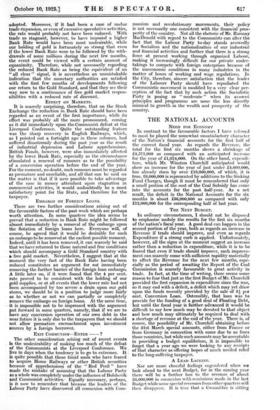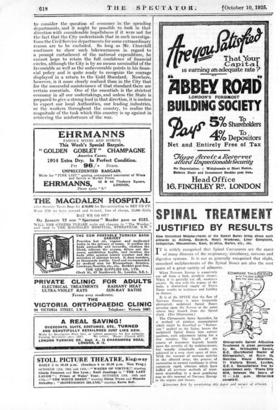THE NATIONAL ACCOUNTS NEED FOR ECONOMY In contrast to the
favourable factors I have referred to must be placed the somewhat unsatisfactory character of the Nation's financial accounts for the first half of the current fiscal year. As regards the Revenue, the total for the first six months shows a shrinkage of £4,575,000 as compared with an anticipated increase for the year of £1,624,000. On the other hand, expendi- ture, which Mr. Winston Churchill anticipated would show an increase for the year of just under £4,000,000, has already risen by over £19,000,000, of which, it is true, £6,000,000 is represented by additions to the Sinking Fund Charges, though it must be remembered that only a small portion of the cost of the Coal Subsidy has come into the accounts for the past half-year. As a net result, the deficit in the National Accounts for the six months is about £86,000,000 as compared with only £12,000,000 for the corresponding half of last year.
Tun NEXT BUDGET.
In ordinary circumstances, I should not be disposed to emphasize unduly the results for the first six months of the nation's fiscal year. A good deal can happen in the second portion of the year, both as regards an increase in Revenue if trade should improve, and even as regards Expenditure if a strong curb is applied. Unfortunately, however, all the signs at the moment suggest an increase rather than a reduction in expenditure, while it is to be feared that even if trade should improve, such improve- ment can scarcely come with sufficient rapidity materially to affect the Revenue for the next few months, espe- cially as the period of awaiting the Report of the Coal i Commission is scarcely favourable to great activity in trade. In fact, at the time of writing, there seems some reason to fear that just as the first Budget of Mr. Churchill provided the first expansion in expenditure since the war, so it may end with a deficit, a deficit which may yet draw upon the funds recently provided by the sale of 84. per cent. Conversion Loan. Ostensibly, that loan was to provide for the funding of a good deal of Floating Debt, but until the fiscal year is further advanced it would -be difficult to say how much may be devoted to that object and how much may ultimately be required to deal with a shortage of revenue at the end of the year. There is, of course, the possibility of Mr. Churchill obtaining before the 81st March special amounts, either from France or from Germany in connection with sums due to us from those countries, but while such amounts may be acceptable in providing a budget equilibrium, it is impossible to forget that a year ago we were looking to any receipts of that character as offering hopes of much needed relief to the long-suffering taxpayer.
A LEAD LACKING.
Nor are more cheerful feelings engendered when we look ahead to the next Budget, for in the coming year there will be a further loss to the revenue of about £6,000,000 in connexion with remissions made in the last Budget while some special revenues from other quarters will then disappear. it is true that a Committee is sitting to consider the question of economy in the spending departments, and it might be possible to look in that direction with considerable hopefulness if it were not for the fact that the City understands that in such investiga- tions the Civil Service departments for some extraordinary reason are to be excluded. So long as ,Mr. Churchill continues to show such lukewarmness in regard to a prompt curtailment of the national expenditure, he cannot hope to retain the full confidence of financial circles, although the City is by no means unmindful of the favourable as well as the unfavourable points in his finan- cial policy and is quite ready to recognize the courage displayed in a return to the Gold Standard. Nowhere, however, is it more clearly realized than in the City that for the successful maintenance of that standard there are certain essentials. One of the essentials is the.strictest economy in all our undertakings, and unless the. State is prepared to give a strong lead in that direction, it is useless to expect our local Authorities, our leading . industries, or the workers throughout the country, to realize the magnitude of the task which this country is up against in retrieving the misfortunes of the war.



























































 Previous page
Previous page